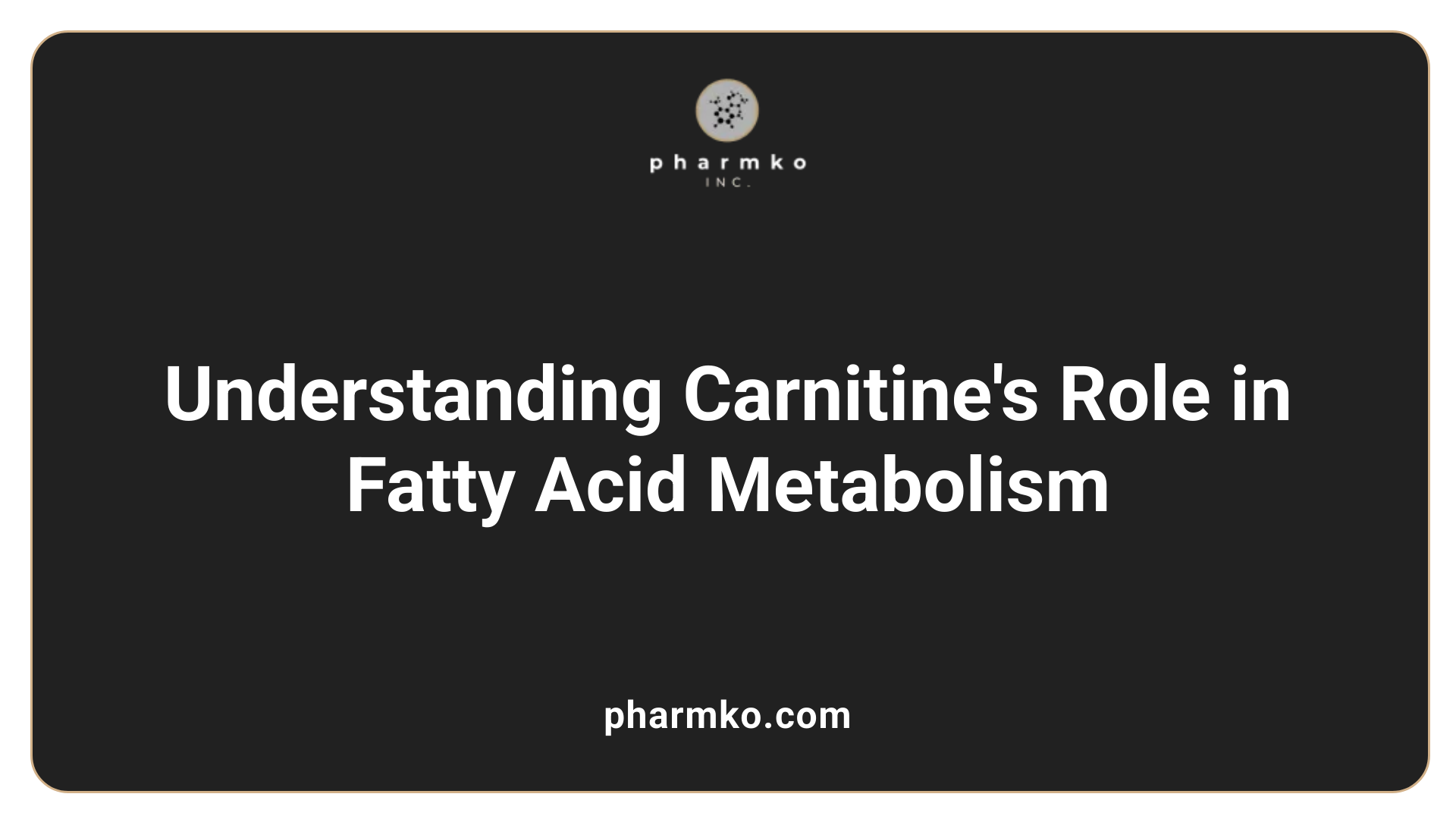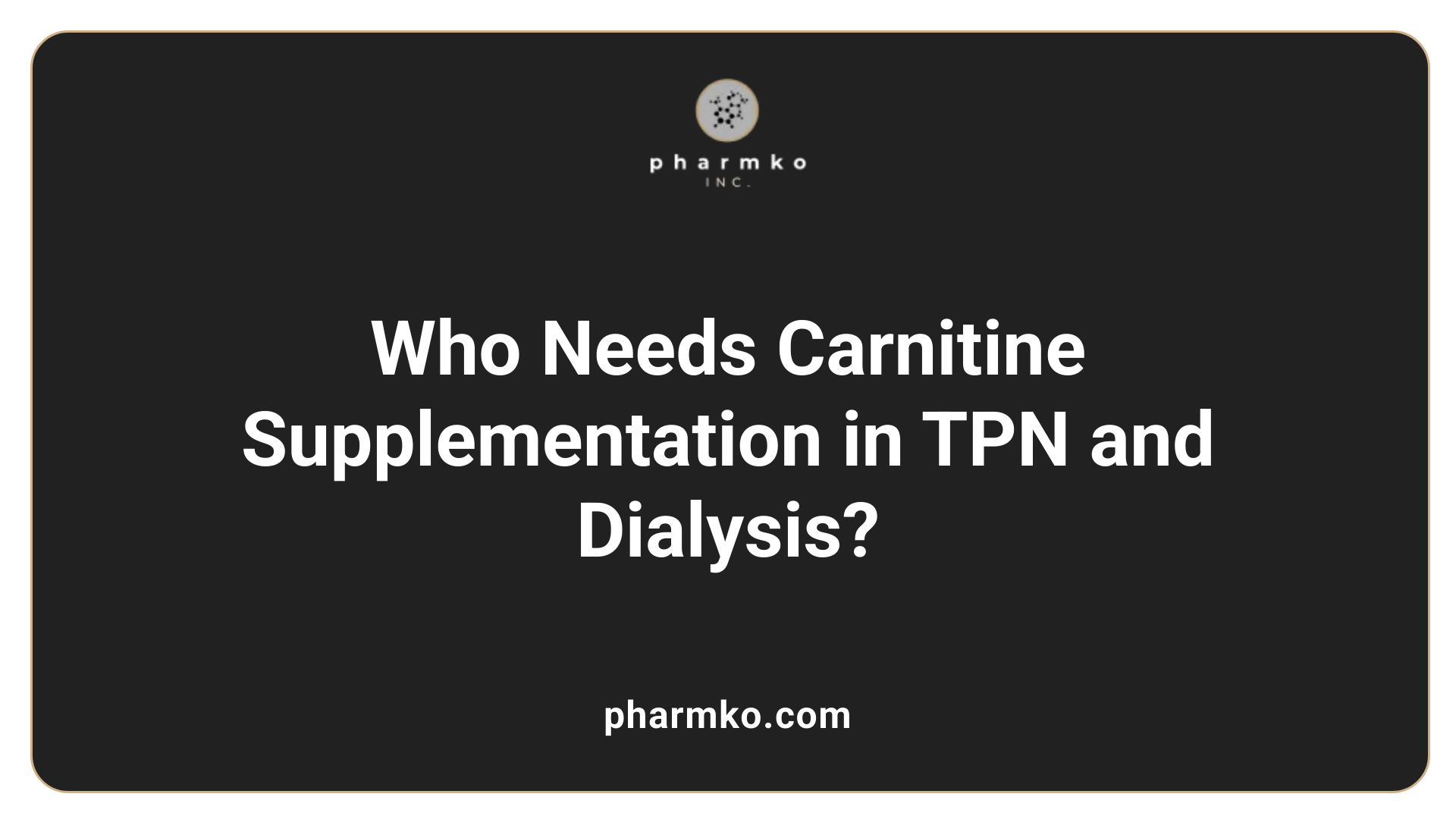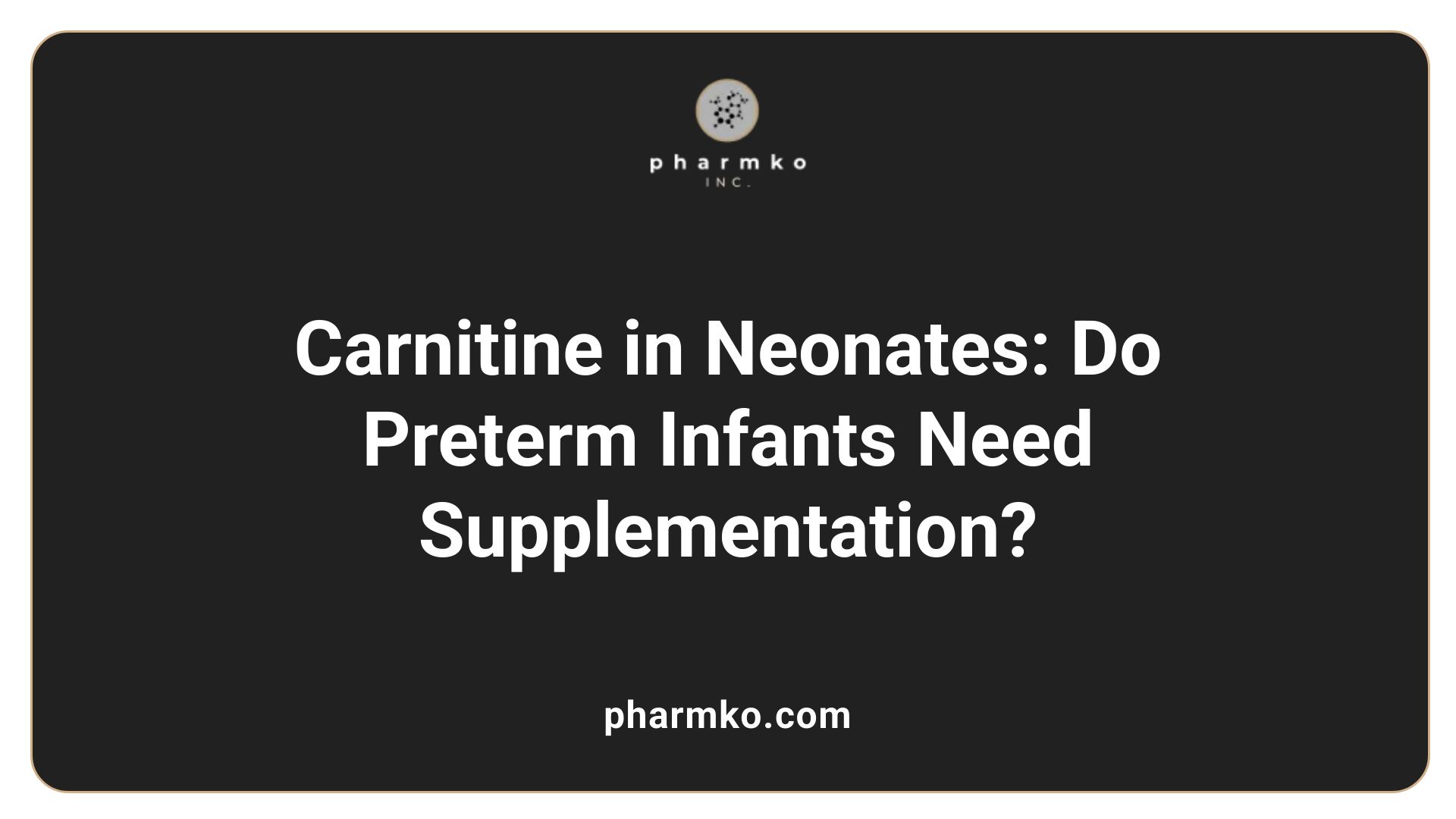Understanding the Role of Carnitine in TPN and IDPN Therapy
Unraveling the Importance of Carnitine in Parenteral Nutrition
Carnitine, an essential nutrient for energy production, plays a pivotal role in the metabolic processes supporting patients on Total Parenteral Nutrition (TPN) and Intradialytic Parenteral Nutrition (IDPN). This article explores the mechanisms, clinical implications, and emerging guidelines surrounding the use of carnitine to optimize patient outcomes during parenteral therapy.
Fundamental Metabolic Role of Carnitine

What is the role of carnitine in nutritional support, particularly in TPN and IDPN therapy?
Carnitine is essential for proper metabolic functioning, especially in the breakdown and utilization of fats for energy. It acts as a cofactor that allows functionally necessary transport of long-chain fatty acids into mitochondria—the powerhouses of the cell—where these fats are oxidized to produce energy.
In clinical settings such as Total Parenteral Nutrition (TPN) and Intradialytic Parenteral Nutrition (IDPN), patients often have insufficient carnitine levels. This is particularly true for individuals with chronic illnesses, liver or kidney diseases, or those on long-term dialysis, where losses or impaired synthesis of carnitine can occur. Due to the lack of carnitine in many parenteral solutions and the increased metabolic demands, these patients may experience decreased mitochondrial function, muscle weakness, and metabolic disturbances.
Supplementation of carnitine in TPN and IDPN protocols can thus be quite beneficial. It helps restore the transport function of fatty acids into mitochondria, enhances energy production, and supports muscle maintenance and repair. For patients with deficiencies, carnitine supplementation can improve mitochondrial efficiency and prevent complications such as muscle wasting and energy deficits.
Certain diseases—such as cirrhosis, hepatic encephalopathy, and cardiovascular conditions—are linked with reduced carnitine levels. Supplementing carnitine in these cases has shown potential in improving metabolic health. Overall, maintaining adequate carnitine levels via supplementation in nutritional support not only optimizes fat metabolism but also supports overall tissue health and recovery in critically ill or chronically ill patients.
Conditional Essentiality of Carnitine in TPN and IDPN

What are the determinants for deficiencies?
Carnitine is vital for managing the body's fat, carbohydrate, and amino acid metabolism, primarily by aiding the transport of fatty acids into the mitochondria for energy production. In healthy individuals, the body synthesizes enough carnitine from amino acids such as lysine and methionine. However, certain groups are more prone to deficiency: preterm infants, patients on long-term total parenteral nutrition (TPN), and those undergoing dialysis. Preterm infants are born with limited reserves, and the absence of added carnitine in TPN solutions can lead to lower plasma and tissue levels, impairing fatty acid oxidation.
Once on TPN for extended periods, patients often experience decreased plasma carnitine levels due to insufficient synthesis and supplementation. Similarly, dialysis patients, particularly those on intradialytic parenteral nutrition (IDPN), can lose carnitine across the dialysis membrane, resulting in deficiencies that may affect metabolic health.
Impact of long-term TPN and dialysis
Prolonged TPN lacking added carnitine can decrease plasma concentrations, which affects fatty acid metabolism especially in infants and adults with compromised liver function. This can impair energy production, cause muscle weakness, and potentially contribute to liver complications such as PN-induced cholestasis.
IDPN, a nutritional strategy during dialysis, has shown improvements in certain markers like prealbumin, indicating better nutritional status. However, the broader clinical benefits regarding survival or quality of life remain unconfirmed.
Long-term infusion of high lipid doses in TPN also correlates with lipid accumulation in the liver, leading to complications like non-alcoholic fatty liver disease (NAFLD). Patients with pre-existing liver or metabolic issues are susceptible to these effects, emphasizing the importance of monitoring and possibly supplementing nutrients like carnitine.
Transport and biosynthesis deficits
The ability to produce and transport carnitine can be compromised in certain health states. For preterm infants, limited biosynthesis and stores increase their dependence on external sources. In adult patients receiving TPN, the lack of carnitine in nutrition solutions contributes to deficiency, impacting fatty acid oxidation.
Furthermore, ongoing research suggests that supplementing TPN with L-carnitine may enhance fatty acid oxidation and nitrogen balance, especially in vulnerable populations like preterm infants or post-surgical patients. However, definitive evidence supporting routine use remains limited.
| Population Group | Deficiency Risk | Consequences | Supplementation Recommendations |
|---|---|---|---|
| Preterm infants | Limited reserves, no added carnitine | Fatty acid oxidation impairments, energy deficits | Prophylactic, 2–5 mg·kg⁻¹·day⁻¹, monitor levels |
| Long-term TPN patients | Insufficient biosynthesis, no supplementation | Metabolic disturbances, potential liver issues | Consider monitoring; supplement if deficient |
| Dialysis patients | Loss during dialysis | Fatty acid metabolism impairments | Supplement if deficiency observed |
Clinical considerations
While supplementation can help restore optimal carnitine levels, current guidelines recommend measuring plasma and red blood cell carnitine to guide dosing. Typical supplementation involves 2–5 mg·kg⁻¹·day⁻¹ of L-carnitine, with higher doses reserved for specific pharmacologic needs. Personalized assessment ensures that patients most at risk receive appropriate therapy, minimizing the potential for metabolic disturbances and related complications.
In summary, carnitine behaves as a conditionally essential nutrient, particularly in infants on TPN and dialysis patients. Ensuring adequate levels through monitoring and targeted supplementation supports better metabolic health in these vulnerable groups.
Guidelines and Recommendations for Carnitine Use

What are the guidelines and considerations for using carnitine in TPN and IDPN therapy?
In total parenteral nutrition (TPN) and intradialytic parenteral nutrition (IDPN) settings, the decision to supplement with carnitine must be carefully tailored to each patient's specific health status. Carnitine is considered a conditionally essential nutrient, especially in patients with long-term TPN, as plasma and tissue levels often decrease during extended use. For example, prematurity or certain disease states can lead to limited endogenous synthesis and reserves.
Healthcare providers should evaluate the patient's clinical background, including their nutritional status, underlying conditions, and any signs of carnitine deficiency, before recommending supplementation. It is common practice to supplement TPN with 2-5 mg/kg/day of pure L-carnitine, which is considered safe and potentially beneficial. In dialysis patients receiving IDPN, supplementation may help restore carnitine levels and has been associated with increased prealbumin—a marker linked to better nutritional and survival outcomes.
Dosing must be calculated according to patient weight and specific needs, with an emphasis on avoiding overdose or toxicity. Monitoring serum and red blood cell carnitine concentrations helps guide therapy, ensuring optimal levels without adverse effects. Compatibility within the PN formulation is also important, as carnitine should not interact negatively with other nutrients, and formulation stability must be confirmed.
In summary, the use of carnitine in TPN and IDPN should be individualized, evidence-based, and closely monitored. The goal is to support metabolic function and improve clinical outcomes while minimizing potential risks.
Carnitine’s Impact on Patient Outcomes and Metabolism
How does carnitine affect patient outcomes and metabolic processes during TPN and IDPN therapy?
Carnitine is crucial for normal metabolic functions, particularly in fat, carbohydrate, and amino acid metabolism. In patients receiving total parenteral nutrition (TPN) or intradialytic parenteral nutrition (IDPN), supplementation of carnitine can influence various metabolic processes.
During TPN, plasma and tissue carnitine levels often decline because standard formulations usually lack this nutrient. When carnitine levels are low, fatty acid oxidation—the process by which fats are converted into energy—may become inefficient, potentially affecting overall energy production. Supplementing carnitine in such cases is considered beneficial, especially since it is regarded as a 'conditionally essential nutrient' in patients on long-term TPN.
Research suggests that supplementation may help modulate substrate utilization by increasing protein oxidation (the breakdown of proteins for energy) and decreasing fat oxidation. This shift can support better metabolic flexibility in critically ill or malnourished patients. However, current evidence from clinical trials and systematic reviews indicates that parenteral carnitine does not significantly improve critical outcomes such as lipid, energy, or nitrogen metabolism in the early phases of trauma or critical illness.
In essence, while carnitine may influence some metabolic parameters such as substrate utilization, its impact on improving clinical recovery, muscle preservation, or energy efficiency in patients without existing deficiency remains uncertain. Excessive supplementation could potentially impair fat oxidation, leading to less efficient energy use. Therefore, routine high-dose carnitine therapy is not recommended unless specific deficiencies are identified.
Overall, existing data do not conclusively support that parenteral carnitine enhances patient outcomes during TPN and IDPN therapy. Future research is necessary to better understand the potential therapeutic roles of carnitine in these nutritional interventions.
Carnitine in Renal and Dialysis-related Nutrition Management
What is the role of carnitine in managing patients with renal or dialysis-related nutritional issues?
In patients undergoing dialysis, particularly those on intradialytic parenteral nutrition (IDPN), carnitine levels can become depleted. This deficiency may lead to symptoms such as fatigue, muscle weakness, and metabolic disturbances because carnitine is essential for fat, carbohydrate, and amino acid metabolism.
Supplementing carnitine in these patients can help replenish plasma and tissue levels, thus supporting fatty acid oxidation and energy production. While current evidence does not strongly advocate for pharmacological doses unless in specific metabolic disorders, a typical dietary intake or supplementation ranging from 2-5 mg/kg/day has shown potential benefits.
Monitoring plasma and red blood cell carnitine levels is recommended to guide supplementation and ensure optimal levels. In some cases, especially when deficiency is identified, intravenous administration of carnitine may be used as part of clinical management.
Levels in dialysis patients
Studies indicate that prolonged dialysis and parenteral nutrition without added carnitine can lower plasma concentrations, possibly impairing fatty acid oxidation and energy status. This reduction emphasizes the importance of assessing carnitine status in dialysis patients to prevent deficiency-related complications.
Restoration of deficiency
Prophylactic or therapeutic carnitine supplementation can increase plasma levels swiftly. For postoperative or critically ill patients, intravenous carnitine has demonstrated safety and efficiency, resulting in higher serum levels and potentially aiding in recovery. It also may decrease inflammatory markers such as C-reactive protein (CRP), contributing to better clinical outcomes.
Support of fatty acid metabolism
Carnitine acts as a shuttle for long-chain fatty acids into the mitochondria, facilitating their β-oxidation and energy production. In dialysis and other renal patients, restoring carnitine levels supports this process, potentially improving physical strength and overall metabolism.
| Aspect | Details | Additional Notes |
|---|---|---|
| Deficiency in dialysis | Common due to removal during dialysis processes | May lead to fatigue, muscle weakness, and metabolic issues |
| Supplementation approach | Typically 2-5 mg/kg/day, monitored via blood tests | IV forms are used for rapid replenishment |
| Clinical benefits | Improved energy metabolism, potential decrease in inflammation | More studies are needed to confirm long-term benefits |
Overall, managing carnitine levels is an integral part of nutritional therapy for dialysis patients, aiming to improve their metabolic health and quality of life.
Strategies for Optimizing Carnitine Use in Clinical Nutrition
What are the best approaches for personalized supplementation of carnitine?
Personalized supplementation of carnitine begins with an assessment of each patient's specific needs. This involves monitoring plasma and red blood cell carnitine levels to detect deficiencies early, especially in patients on total parenteral nutrition (TPN) or with conditions like dialysis where carnitine may be depleted. Tailoring doses within the common range of 2–5 mg per kilogram of body weight per day helps ensure adequate replacement while minimizing risks.
Adjustments to supplementation are based on the patient's metabolic response, clinical condition, and any potential interactions with other nutrients in their parenteral nutrition (PN) formulation. For instance, in cases of carnitine deficiency, targeted supplementation can improve fatty acid oxidation, nitrogen balance, and overall energy production.
How is monitoring levels important in this context?
Regular monitoring of carnitine levels is essential to evaluate the effectiveness of supplementation and to prevent toxicity. Measuring serum and red blood cell carnitine concentrations provides a clearer picture of the patient's status and guides dosage adjustments.
This ongoing assessment helps clinicians detect emerging deficiencies promptly, especially in patients with compromised biosynthesis, such as preterm infants or those with malabsorption issues. It also ensures that supplementation remains within safe limits, reducing the risk of adverse effects.
What measures ensure safety and effectiveness?
Safety and efficacy hinge on careful dose management, appropriate patient selection, and adherence to clinical guidelines. Using pure L-carnitine in doses of 2-5 mg/kg/day, monitored by regular lab assessments, delivers effective treatment with minimal safety concerns.
Compatibility and stability in parenteral solutions are critical considerations; carnitine should be prepared and administered in ways that preserve its integrity. Special attention should be paid to renal function, especially in dialysis patients, as impaired clearance can lead to accumulation.
Incorporating ongoing research updates, following established protocols, and adjusting therapy based on individual responses will further optimize outcomes. Such tailored approaches help achieve metabolic balance, support growth and recovery, and minimize complications associated with deficiency or over-supplementation.
Carnitine in Neonatal and Pediatric Parenteral Nutrition

Are preterm infants born with limited reserves of carnitine?
Preterm infants are born with naturally limited stores of carnitine, a crucial nutrient involved in energy production from fats. Because they miss out on the final stages of fetal accumulation of this nutrient, their initial reserves are lower compared to full-term babies. This deficiency can impact their ability to effectively oxidize fatty acids, which is essential for energy, especially during growth and recovery.
How does carnitine impact fatty acid oxidation?
Carnitine serves as a shuttle, transporting long-chain fatty acids into the mitochondria where they undergo β-oxidation to produce energy. Without sufficient carnitine, fatty acid oxidation is impaired, potentially leading to energy deficits. Some studies suggest that supplementing TPN with L-carnitine improves fatty acid oxidation in preterm infants, possibly supporting better metabolic function and energy availability.
Is routine L-carnitine supplementation necessary in neonatal TPN?
Currently, the necessity of routine L-carnitine supplementation in neonatal TPN remains unproven. While supplementation can increase plasma carnitine levels and might improve fatty acid oxidation and nitrogen balance, there is no definitive evidence that it significantly impacts important clinical outcomes like weight gain, survival, or long-term health.
What do current guidelines recommend?
Healthcare providers are advised to assess each preterm infant individually. Monitoring carnitine levels and metabolic markers can guide whether supplementation is needed. The decision should be based on a thorough clinical evaluation rather than routine addition to TPN solutions. More research is required to establish whether routine supplementation provides meaningful benefits in neonatal care.
Carnitine and Parenteral Nutrition Induced Liver Disease
How does carnitine influence the management of PN-associated cholestasis?
Parenteral Nutrition (PN) can sometimes lead to cholestasis, which is the impairment or stoppage of bile flow, not caused by other liver diseases or blockages. One contributing factor to this condition is the excess infusion of glucose and lipids during PN. Increased glucose stimulates insulin secretion, which promotes fatty acid synthesis in the liver. When high amounts of lipids are also infused, it can lead to triglyceride buildup, liver inflammation, and, over time, fibrosis and cirrhosis.
A significant aspect of this process is the role of carnitine, a nutrient essential for fatty acid metabolism. Carnitine acts as a shuttle, transporting long-chain fatty acids into mitochondria, where they are broken down to produce energy. In patients on long-term PN, especially preterm infants and those with certain health issues, plasma and tissue levels of carnitine are often low or depleted due to insufficient biosynthesis and the absence of added supplementation.
Carnitine deficiency impairs the ability of the liver to oxidize fatty acids efficiently. This impairment leads to increased fat accumulation within the liver cells, which can worsen cholestasis. Therefore, checking for carnitine deficiency in cases of refractory PN cholestasis is highly recommended.
If a deficiency is identified, intravenous carnitine supplementation can be beneficial. Restoring adequate carnitine levels may improve fatty acid oxidation, reduce liver fat buildup, and potentially aid in resolving cholestasis. This intervention should be part of a comprehensive treatment plan that includes the use of ursodeoxycholate to facilitate bile flow and efforts to minimize lipid overload.
While more research is necessary, current evidence suggests that supplementing carnitine in cases of deficiency can be a useful strategy in managing PN-associated cholestasis, helping to restore fatty acid metabolism and support liver health.
Postoperative Carnitine Use and Surgical Outcomes
What is the evidence for intravenous carnitine administration in surgical patients?
Intravenous carnitine given during postoperative parenteral nutrition (PN) with lipid emulsions has shown promising effects in surgical patients. Research indicates that administering carnitine can reduce inflammation following surgery. One notable marker for this is C-reactive protein (CRP), a protein that increases with inflammation.
Studies reveal that patients receiving IV carnitine experience a greater decrease in CRP levels from postoperative day 3 to day 7. This suggests that carnitine helps modulate the inflammatory response that often occurs after surgery.
Additionally, serum carnitine levels are significantly higher in patients who receive the supplement, confirming effective absorption and utilization. Importantly, these interventions have been well tolerated, with no significant difference in postoperative complications between those who received carnitine and control groups.
While the current evidence points to a potential benefit in reducing inflammation and possibly aiding metabolic recovery, it is still early. More robust, large-scale clinical trials are needed to determine if intravenous carnitine consistently improves outcomes like infection rates, wound healing, or length of hospital stay.
Ultimately, IV carnitine appears to be a safe adjunct in the postoperative nutritional management of surgical patients, with some data supporting its role in possibly decreasing inflammatory responses and supporting recovery processes.
Monitoring and Safety of Carnitine Supplementation

What are important considerations for monitoring and ensuring safety with carnitine therapy?
Careful monitoring of patients receiving carnitine supplements is essential, especially in clinical settings such as TPN or dialysis. Measuring serum and red blood cell (RBC) carnitine levels helps identify deficiencies and prevents excesses, which could disrupt normal metabolism or cause adverse reactions. Regular tests of metabolic parameters, electrolytes, and liver function can offer additional insights into the patient’s overall response.
Clinicians should tailor the dose of carnitine based on individual patient needs, with adjustments made according to test results and clinical response. This personalized approach ensures the benefits are maximized while minimizing potential risks.
Although generally safe when used at recommended doses—typically around 2-5 mg/kg/day—some patients may experience minor side effects. These include gastrointestinal discomfort, fishy body odor, or rare allergic reactions. Consistency in considering compatibility when adding carnitine to parenteral solutions helps avert unintended interactions.
Overall, vigilant assessment of lab parameters and clinical signs, along with a cautious dosing strategy, are integral to the safe and effective use of carnitine in nutritional therapy.
Carnitine in Neonatal and Pediatric Parenteral Nutrition

Lower reserves in preterm infants
Preterm infants are born with limited stores of carnitine, which plays a vital role in energy production through fatty acid oxidation. Since they are unable to synthesize sufficient amounts immediately after birth, their reliance on external sources increases.
During total parenteral nutrition (TPN), these infants often do not receive added carnitine in their nutrient solutions. This deficiency can impair their ability to efficiently oxidize fatty acids, potentially affecting growth and development.
Impact on fatty acid oxidation
Carnitine acts as a shuttle, transporting long-chain fatty acids into the mitochondria where they are burned for energy. In preterm infants, this process can be compromised due to low carnitine reserves.
Research indicates that supplementing TPN with L-carnitine can enhance fatty acid oxidation after fat challenges, suggesting a possible benefit in maintaining adequate carnitine levels. This is particularly relevant during periods of high energy demand or metabolic stress.
Current research and recommendations
Despite some promising findings, there is not enough conclusive evidence to recommend routine L-carnitine supplementation for all preterm infants on TPN. Studies have yet to demonstrate significant improvements in outcomes like weight gain, morbidity, or overall hospital stay.
Guidelines currently advocate a cautious, individualized approach. They recommend monitoring carnitine levels and metabolic function, and considering supplementation only if deficiencies are identified or if clinical signs suggest a need.
In summary, while supplements may support fatty acid oxidation in vulnerable neonates, the practice of routine L-carnitine addition in neonatal TPN remains under evaluation.
Is routine L-carnitine supplementation necessary in neonatal TPN?
It is yet to be established whether routine L-carnitine supplementation is necessary in neonatal TPN. Preterm infants are born with limited carnitine reserves, and parenteral nutrition often lacks added carnitine, which may lead to deficiency. While some studies suggest that fatty acid oxidation improves after fat challenges with L-carnitine supplementation, conclusive evidence to support routine use to improve clinical outcomes, such as growth or morbidity, remains insufficient. Current guidelines recommend cautious assessment of individual neonatal needs, with monitoring of carnitine levels and metabolic function to guide supplementation decisions.
Conclusion: Integrating Carnitine into Parenteral Nutrition Protocols
What are the benefits of supplementing carnitine in clinical nutrition?
Carnitine plays a vital role in energy production by facilitating fatty acid oxidation, which is especially crucial in vulnerable populations like preterm infants, patients on total parenteral nutrition (TPN), and those undergoing dialysis. Supplementing carnitine can help improve fatty acid metabolism, nitrogen balance, and potentially support weight gain and lipid profiles, although evidence for routine use remains limited.
In patients receiving TPN, adding carnitine can counteract the decline in plasma and tissue levels caused by the lack of this nutrient in standard solutions. For preterm infants, prophylactic supplementation may aid in fatty acid utilization, and during postoperative recovery, carnitine has been associated with reduced inflammation and enhanced recovery markers. For hemodialysis patients, intradialytic parenteral nutrition involving carnitine has shown promising results in increasing prealbumin levels, a marker linked to better outcomes and survival.
How can strategies be personalized in clinical nutrition therapy?
Optimizing carnitine use involves individualized assessment through regular measurement of plasma and red blood cell carnitine levels. This allows clinicians to identify deficiencies and tailor supplementation doses accordingly. A typical dose of 2–5 mg·kg⁻¹·day⁻¹ of pure L-carnitine is recommended, ensuring sufficient replenishment without risking toxicity.
Monitoring not only helps in dose adjustment but also in evaluating patient response and metabolic status. Considerations such as renal function, critical illness status, and specific clinical conditions influence the appropriateness of supplementation. Compatibility and stability of carnitine in parenteral solutions should also be verified to maintain safety and efficacy. Personalizing these strategies ensures that the benefits of supplementation are maximized while minimizing potential adverse effects.
What are the existing gaps in research?
Although current evidence supports the biological plausibility and some clinical benefits of carnitine supplementation, definitive guidelines are lacking, especially regarding routine use in neonatal TPN or broad application in adult nutritional therapy. More large-scale, randomized controlled trials are needed to establish clear benefits and optimal dosing protocols.
Furthermore, the long-term safety profile and cost-effectiveness of routine supplementation require further investigation. The impact of carnitine on clinical outcomes such as hospital stay length, morbidity, and mortality compared to standard care remains uncertain. Exploring these gaps through ongoing research will help in developing evidence-based protocols and refine individualized nutritional strategies.
| Topic | Current Understanding | Knowledge Gaps |
|---|---|---|
| Benefits of supplementation | Improves fatty acid oxidation, nitrogen balance, recovery | Long-term outcomes, neonatal benefits, cost-effectiveness |
| Personalization strategies | Monitoring levels, adjusting doses, patient-specific factors | Standardized protocols, optimal monitoring intervals |
| Research needs | Limited clinical trials, safety, and efficacy data | Larger, definitive studies, comprehensive guidelines |
This approach ensures a balanced and evidence-informed integration of carnitine into clinical nutrition therapies, promoting patient safety and optimal metabolic outcomes.
Future Directions and Clinical Considerations in Carnitine Supplementation
While current evidence supports the metabolic necessity of carnitine in patients receiving TPN and IDPN—particularly those with deficiencies—the precise clinical benefits and optimal supplementation strategies continue to evolve. Personalized assessment, careful monitoring, and adherence to emerging guidelines will enable clinicians to harness carnitine's full potential, improving outcomes and metabolic stability in diverse patient populations. Ongoing research is essential to clarify its role further, especially in neonatal, surgical, and dialysis contexts, where metabolic demands and risks are uniquely high.
References
- Newsletters: Carnitine – Who Needs It? - Oley Foundation
- Evidence Brief: Use of Intradialytic Parenteral Nutrition (IDPN ... - NCBI
- Intradialytic parenteral nutrition in maintenance hemodialysis ...
- Carnitine and total parenteral nutrition of the neonate - PubMed
- A systematic review about prophylactic L-carnitine administration in ...
- [PDF] Management of PN-induced Cholestasis
- Intravenous Carnitine Administration in Addition to Parenteral ...













